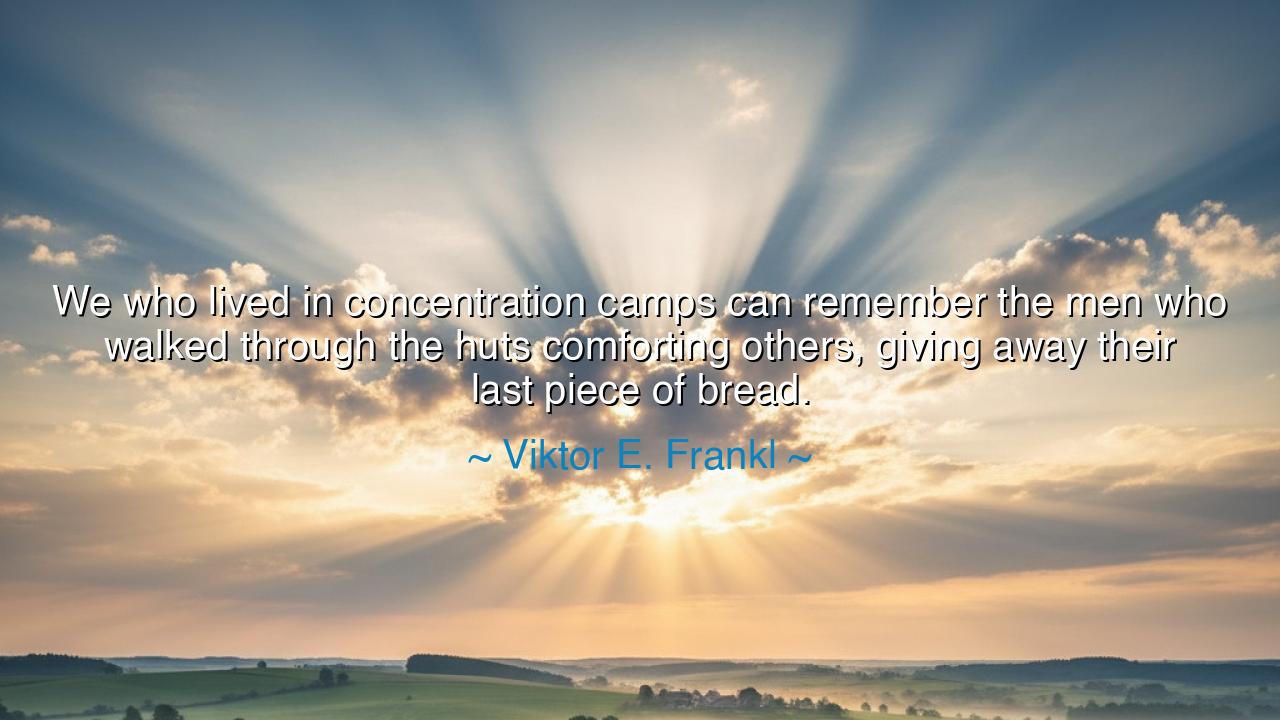
We who lived in concentration camps can remember the men who
We who lived in concentration camps can remember the men who walked through the huts comforting others, giving away their last piece of bread.






In the darkest of times, when all that remains is the barest thread of hope, there are those among us who find the strength to transcend their own suffering. The words of Viktor E. Frankl, a man who himself endured the hellish torment of a concentration camp, ring with an eternal truth: “We who lived in concentration camps can remember the men who walked through the huts comforting others, giving away their last piece of bread.” These words speak to the depths of the human spirit, to the extraordinary capacity of the soul to care for others, even when all hope seems lost.
The ancients taught that the true measure of a person’s worth is not in their strength or their courage alone, but in their compassion—the ability to reach out to another in the midst of suffering and share the smallest of blessings. The great philosophers and warriors of old, from Socrates to Gandhi, spoke of the power of selfless love, a love that is not bound by circumstance but by a commitment to the well-being of others. In the concentration camps, where despair and cruelty ruled the day, there arose a different kind of heroism—one not defined by weapons or power, but by the quiet courage of those who chose to share everything they had, even when they had nothing left.
Imagine, if you will, the horror of being trapped in such a place, where every day was a struggle for survival, where the future seemed as empty as the stomach of the prisoners. And yet, in this abyss of suffering, there were those who found it within themselves to walk among their fellow inmates, offering comfort, extending a hand of kindness, and even sharing their last piece of bread. These men were not driven by duty or by the need for glory, but by the most sacred of human instincts—the desire to ease the pain of another, to remind their fellow beings that dignity and humanity could still be found, even in the most inhumane of conditions.
This act of sharing one’s last piece of bread is more than a mere gesture of generosity; it is a profound sacrifice that speaks to the highest calling of the human spirit. In that act, the man who gave everything away demonstrated that, even in the face of death, the soul can still choose love. Socrates, who chose to face death with calm dignity, taught that the soul’s true purpose is to pursue the good—not just for oneself, but for others. In these words of Frankl, we see the living embodiment of that ideal: the good that remains in the darkest moments is not just survival, but compassion, shared freely, even when there is nothing left to give.
In the story of Anne Frank, another soul who lived in the depths of despair, we find another example of this quiet heroism. While hiding from the Nazi regime, Frank wrote of the small acts of kindness that sustained her family and others in the secret annex. Even in her final days, when hope had almost vanished, she found comfort in the kindness of those around her. The power of giving, of offering what little you have to another in need, transcends even the most horrific circumstances. This is the enduring lesson: no matter how trapped we may feel, no matter how desperate our situation, we always have the power to choose compassion over despair, to reach out with a kindness that can change the course of a life.
The lesson we draw from Frankl’s words is one of sacrifice and love—the kind that transcends the boundaries of survival, that endures even when everything else is lost. We must remember that, no matter the circumstances, we have the power to affect those around us. In our own lives, when faced with hardship, it is easy to turn inward, to focus solely on our own survival. But true strength lies in our ability to share, to offer a hand even when we are empty ourselves. Like those who shared their bread in the camps, we too must create space in our lives for selflessness, for love that asks for nothing in return.
Let us, then, walk forward with this wisdom: when life presses down upon us, when we are faced with struggle and suffering, we must not forget the quiet heroes who, in their darkest moments, chose to give. We too can be those who give, who offer what little we have, who remind the world that even in our weakest moments, we have the power to lift another. In doing so, we do not just survive; we triumph—for in giving, we become a light in the darkness, and in the end, that is the greatest victory of all.






AAdministratorAdministrator
Welcome, honored guests. Please leave a comment, we will respond soon